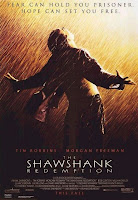One of the lesser known perks of being a
SAG member is that I now have the opportunity to join the SAG Film Society (for a nominal fee, of course), which allows me to attend any of their four or five screenings per month that take place at the
DGA Theater. Mostly, they are films that have just hit the cinemas, but occasionally there is a preview screening of an upcoming release. At the risk of sounding elitist, I have noticed something fascinating from the couple of events that I have attended so far. Somehow, these screenings are a much more pleasant affair than watching a movie with the general public. Perhaps it's because of the near capacity attendance, so the communal atmosphere exudes excitement. Perhaps it's because of the odd rule restricting any food or drink inside the theatre, so the distracting crackling sound of candy wrappers is absent. Perhaps it's because the industry audience are more respectful of the film-going experience, so there is nary a whisper during the course of the picture. Which, I guess, means that I
am an elitist.
Yesterday, Kat and I spent a lazy Sunday afternoon watching another 1994 Best Picture contender...

Forrest Gump
Director:
Robert Zemeckis
Screenplay:
Eric Roth
(based on the novel by Winston Groom)
Starring:
Tom Hanks, Robin Wright, Gary Sinise, Mykelti Williamson, Sally Field
Academy Awards:
13 nominations
6 wins, including Best Picture, Best Director and Best Actor (Hanks)
As Forrest Gump (Hanks) sits down on a bench to wait for his bus, he begins talking to the stranger next to him. He tells her of his childhood growing up in Alabama with his very supportive mother (Field) and his best friend Jenny (Wright). Although intellectually slow, he inadvertently becomes an influential part of U.S. history during the 60s and 70s, meeting most of the Presidents along the way. He's a college football star, a war hero, a ping pong champion, a shrimp boat captain and a distance runner. All the while, Jenny pops in and out of his life, but she always remains on his mind. As the people at the bus stop come and go, he continues his story undeterred, talking to whoever will listen to his simple tale.
It would be easy to dismiss Forrest Gump as just a mindless piece of fluff. Things just seem to happen to the main character with very little action on his behalf. Most of his major accomplishments are not achieved due to any hopes or desires that he may possess, but rather those around him shove him into the spotlight. He becomes a football star because the coach notices he can run fast, but Forrest has no clue what he is doing. He inadvertently sets the Watergate scandal in motion, not because he feels a sense of duty to report the burglary he is witnessing, but because he can't sleep with all those flashlights shining into his room. Even when he saves his entire platoon by carrying them safely out of the jungle, it is more of an act of necessity than genuine heroics.
.jpg)
Yet somehow, Forrest's complete lack of awareness of his influence on the world around him merely makes him more adorable. Yes, the story is fluffy and rambles on from sequence to sequence with no real direction, but Forrest's puppy dog behaviour and oddly enchanting vocal inflection more than compensate to create a sweet and funny film. Plus, the relationship between Forrest and Jenny, a subplot full of charm and poignancy, acts as the story's spine, preventing the picture from becoming totally aimless.
Alan Silvestri's
music is nothing short of divine. Some may call it sappy but Kat and I didn't choose it to feature in our wedding ceremony for nothing. The entire score is touching and inspirational. Not to mention the soundtrack full of provocative hits of the era, perfectly selected to match the images on the screen, including
Everybody's Talkin', a song written for another Best Picture winner, Midnight Cowboy, and heard in this film during an homage to Dustin Hoffman's famous "
I'm walkin' here!" scene.
Tom Hanks earned the second of his back-to-back Best Actor Oscars for the title role. He plays the simpleton with heart, delivering a very moving final speech. Robin Wright's performance as the troubled Jenny is intelligent, never slipping into cliché. Gary Sinise offers a touchingly raw portrayal of Lieutenant Dan, and with the help of some incredible visual effects, he is utterly convincing as an amputee. And before he saw dead people, Haley Joel Osment appears briefly here as Forrest Junior.




.jpg)

.jpg)

.jpg)

.jpg)

.jpg)




